Charles E W Bean, Diaries, AWM38 3DRL 606/238/1 - March 1917 - Part 3
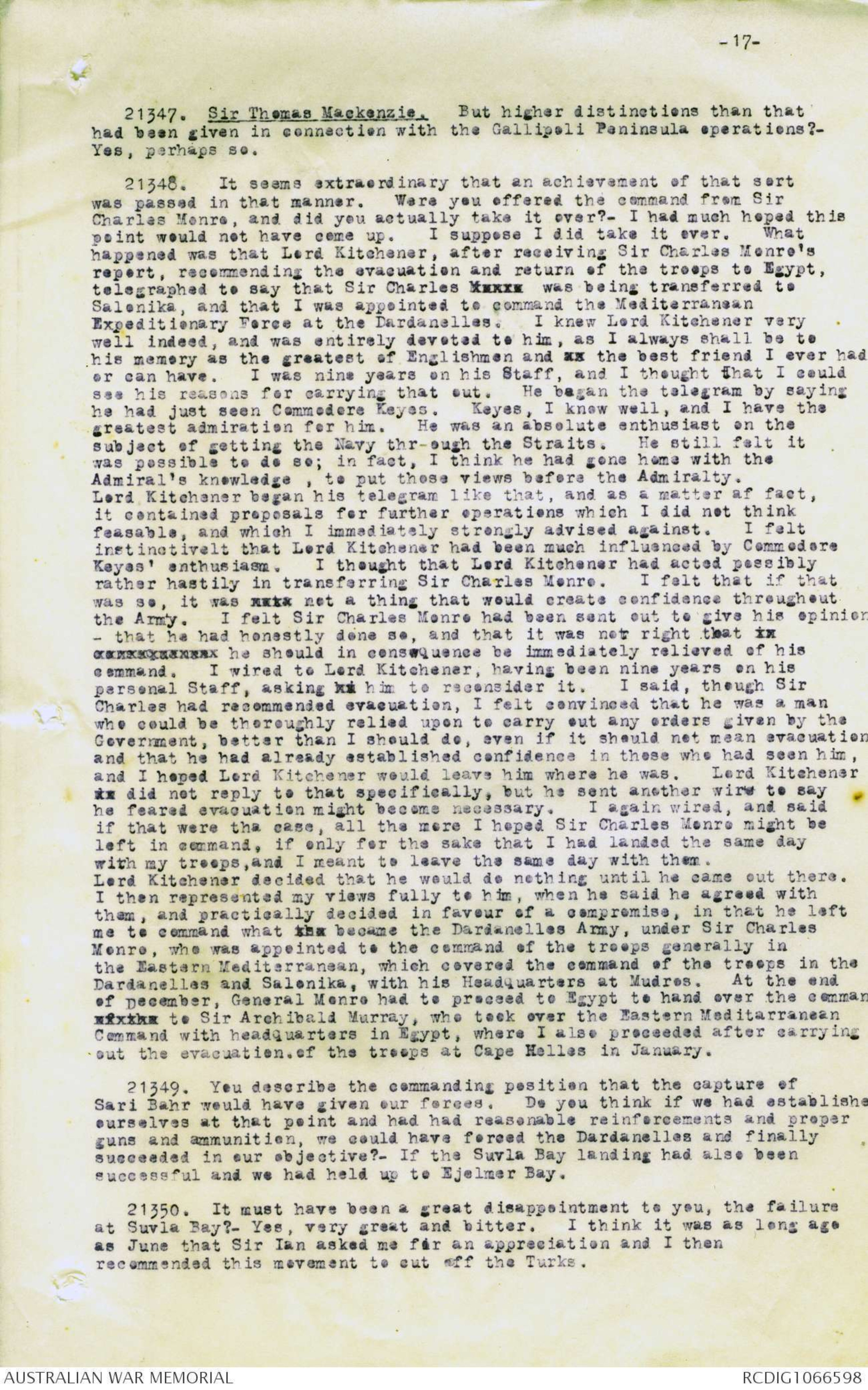
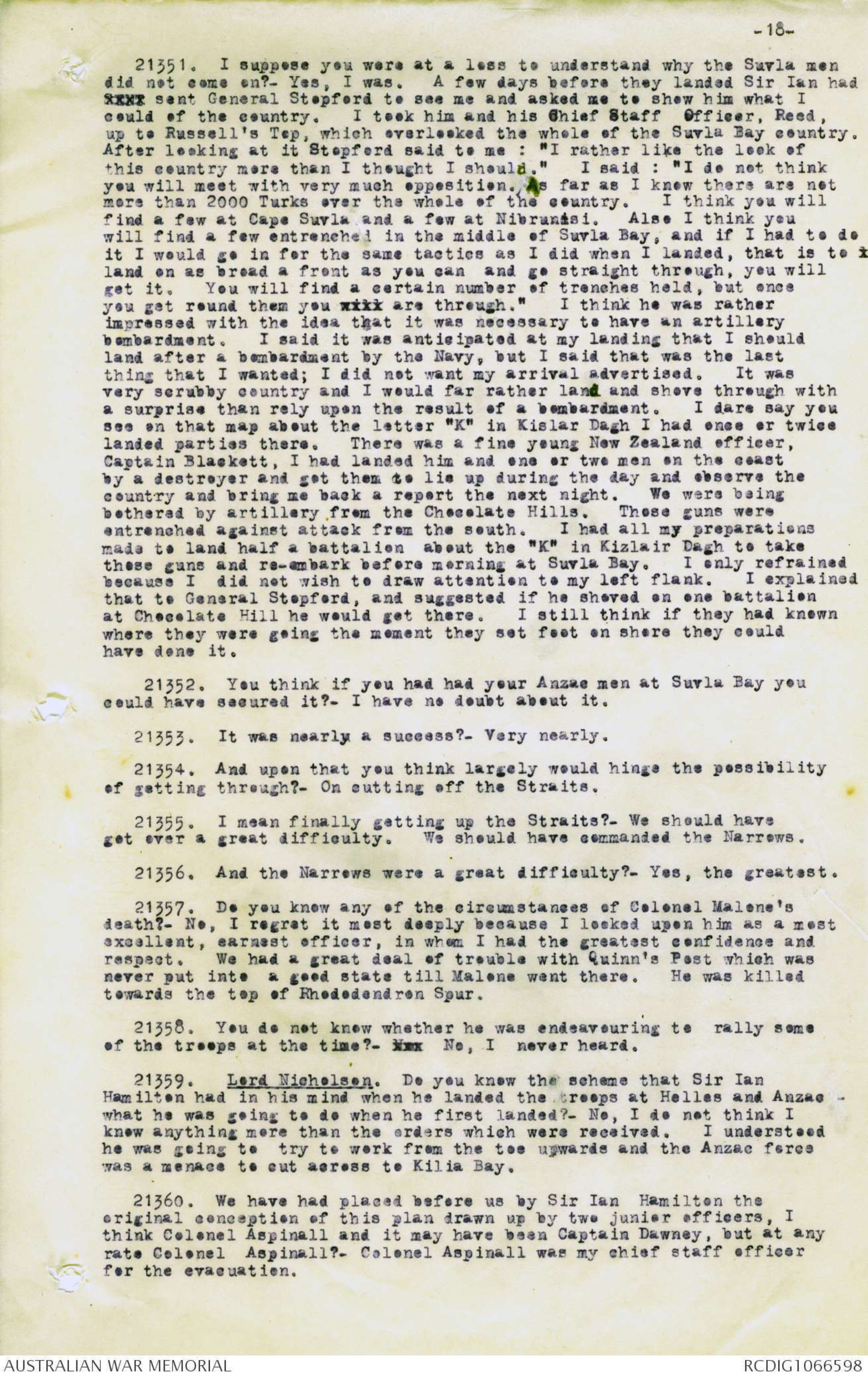
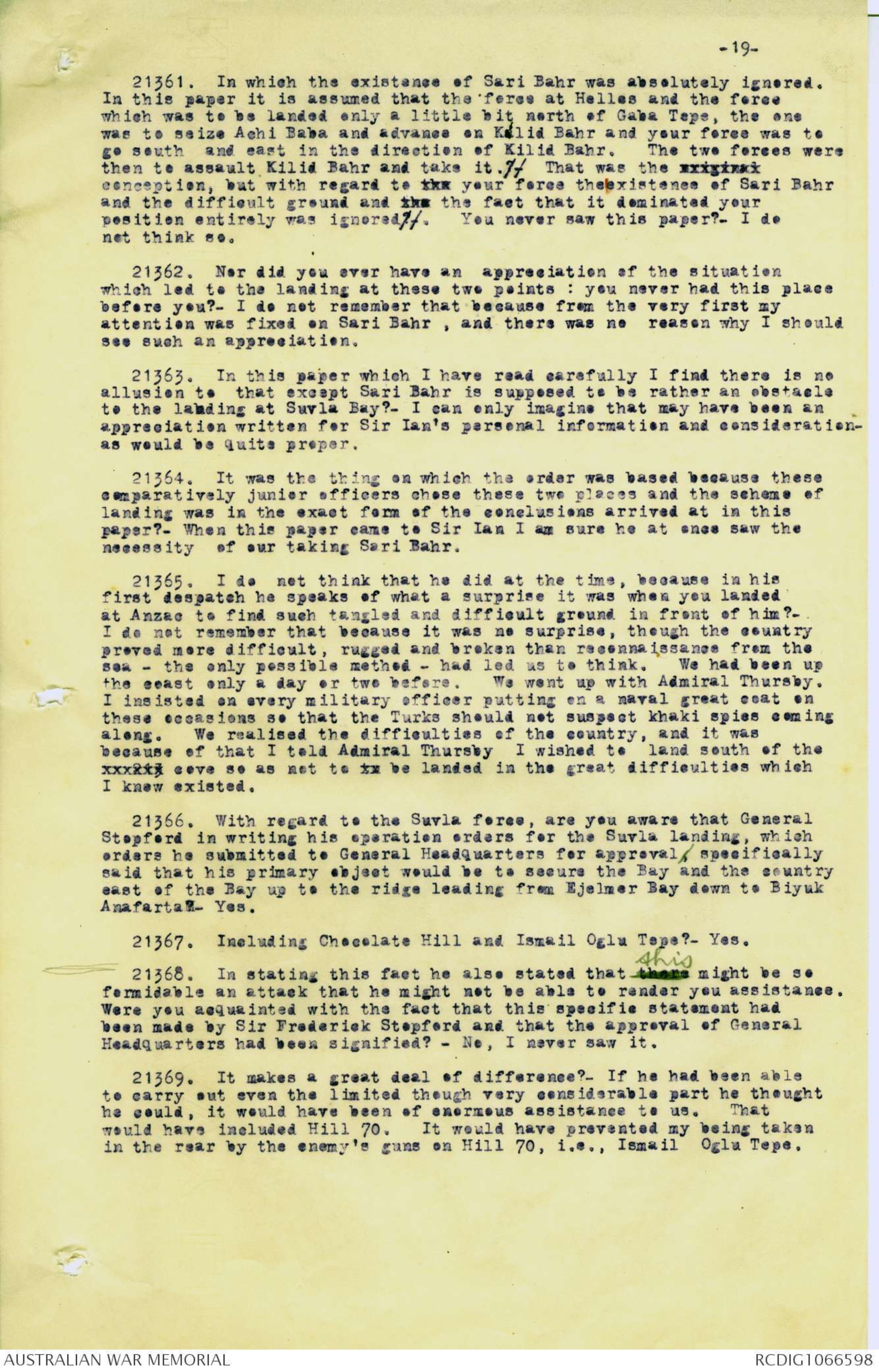
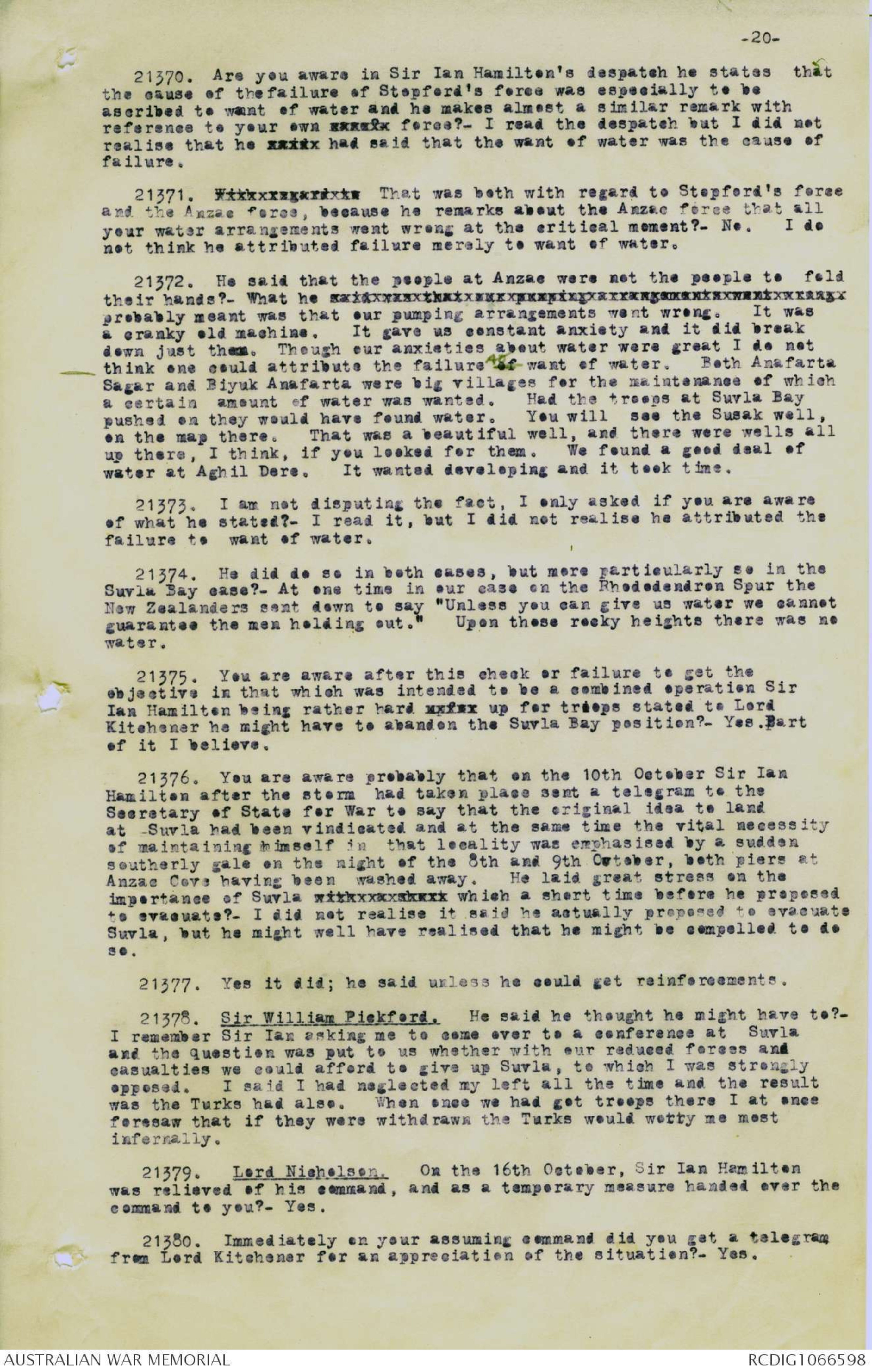
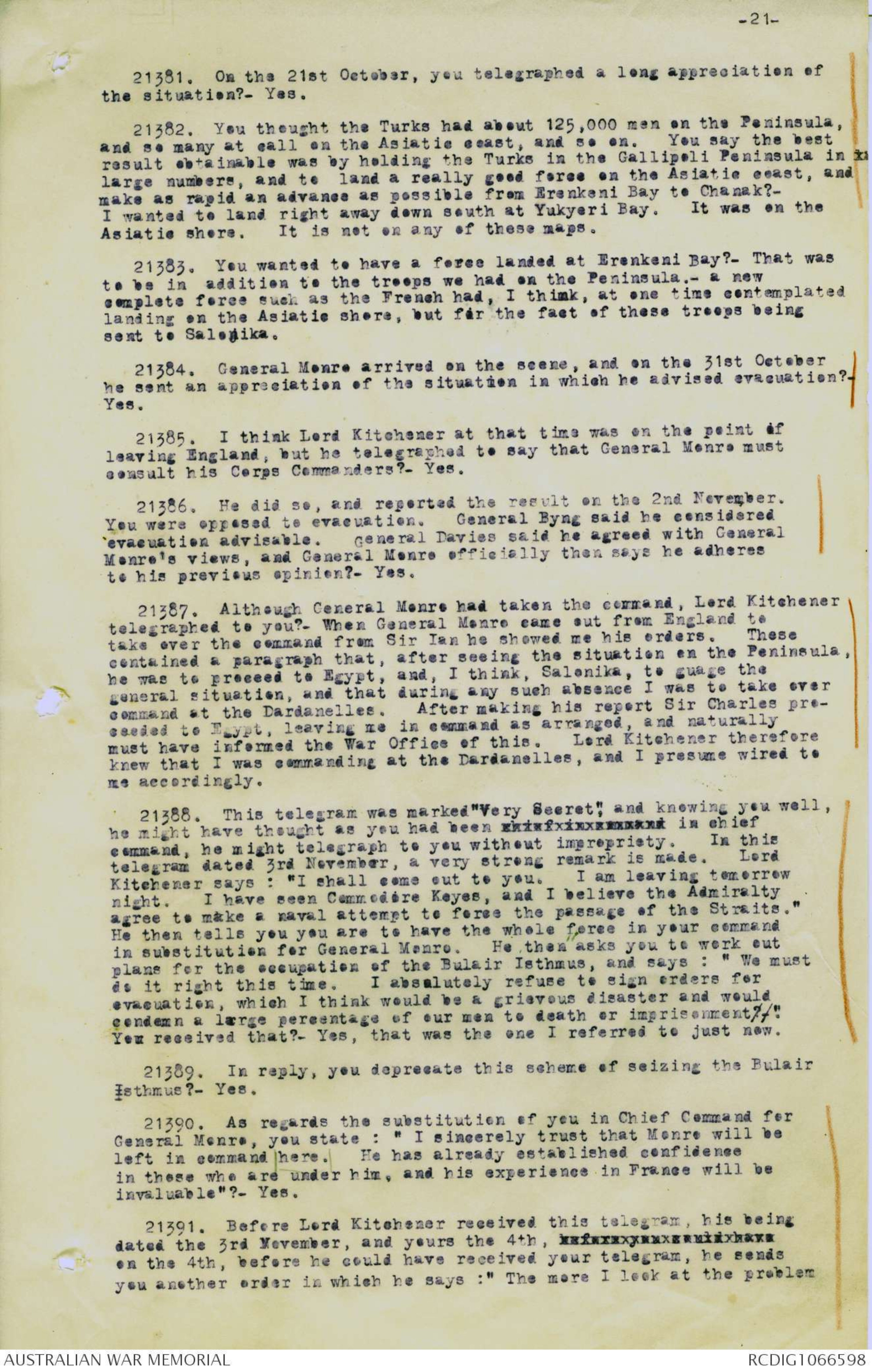
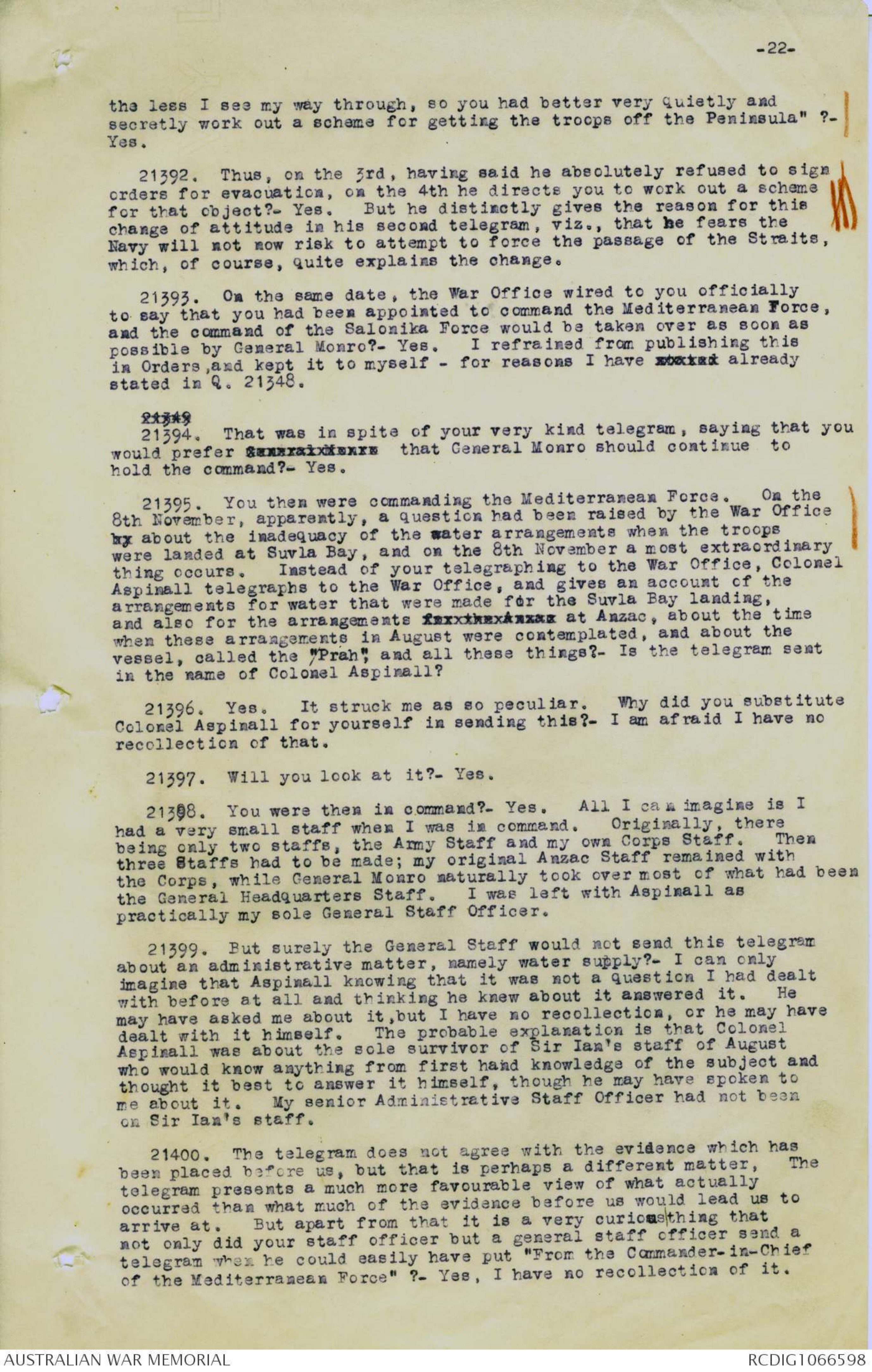
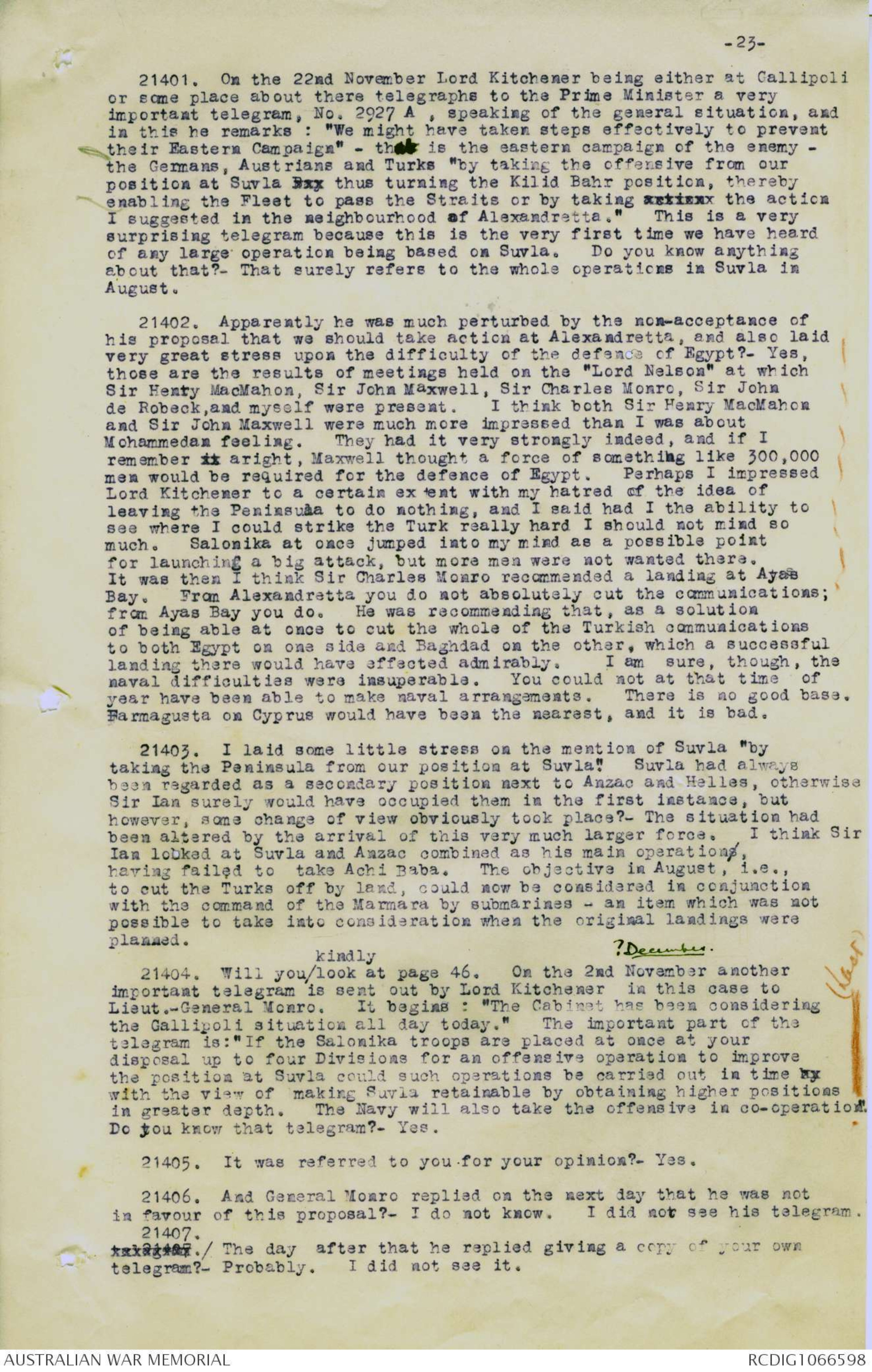
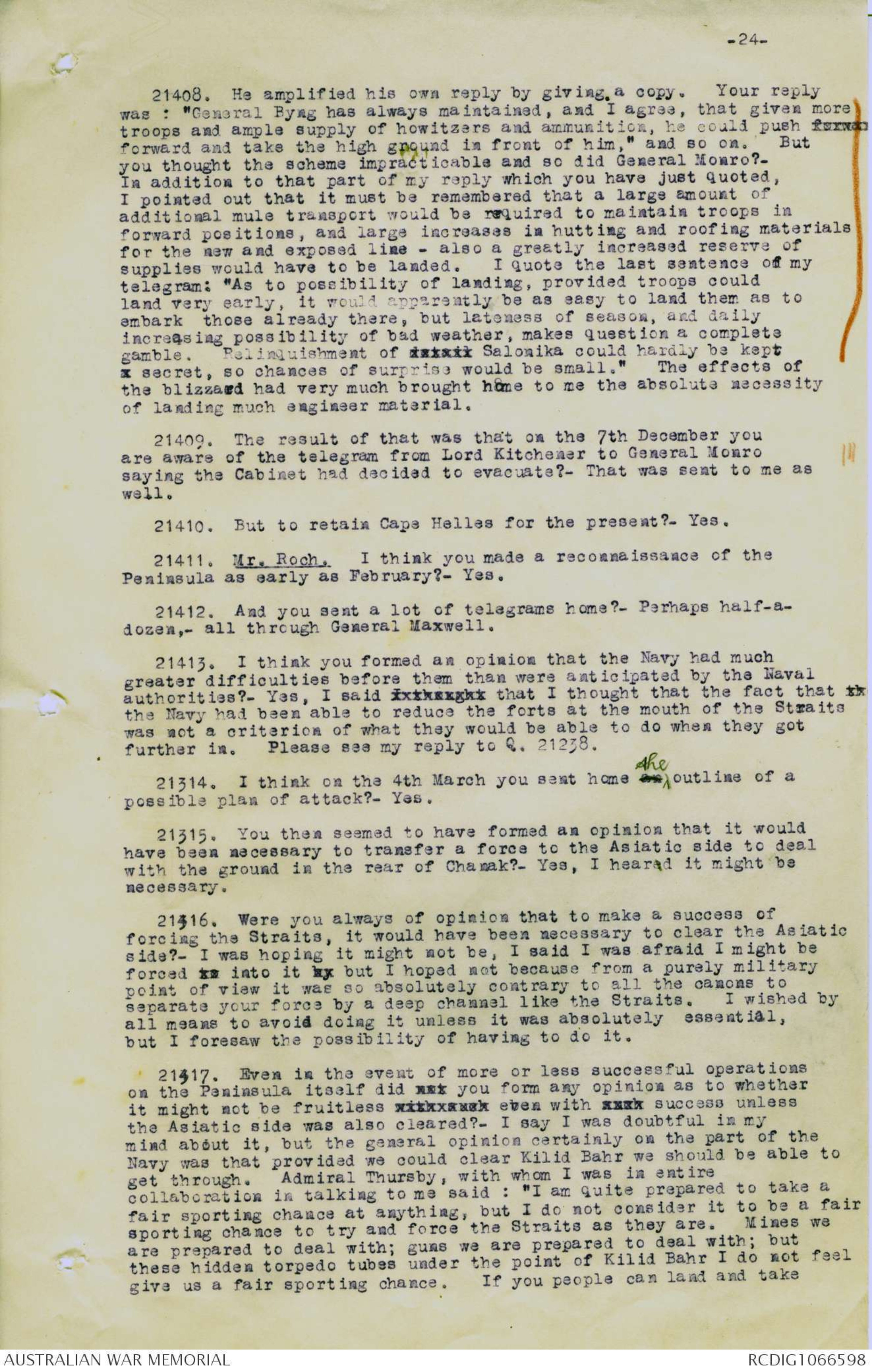
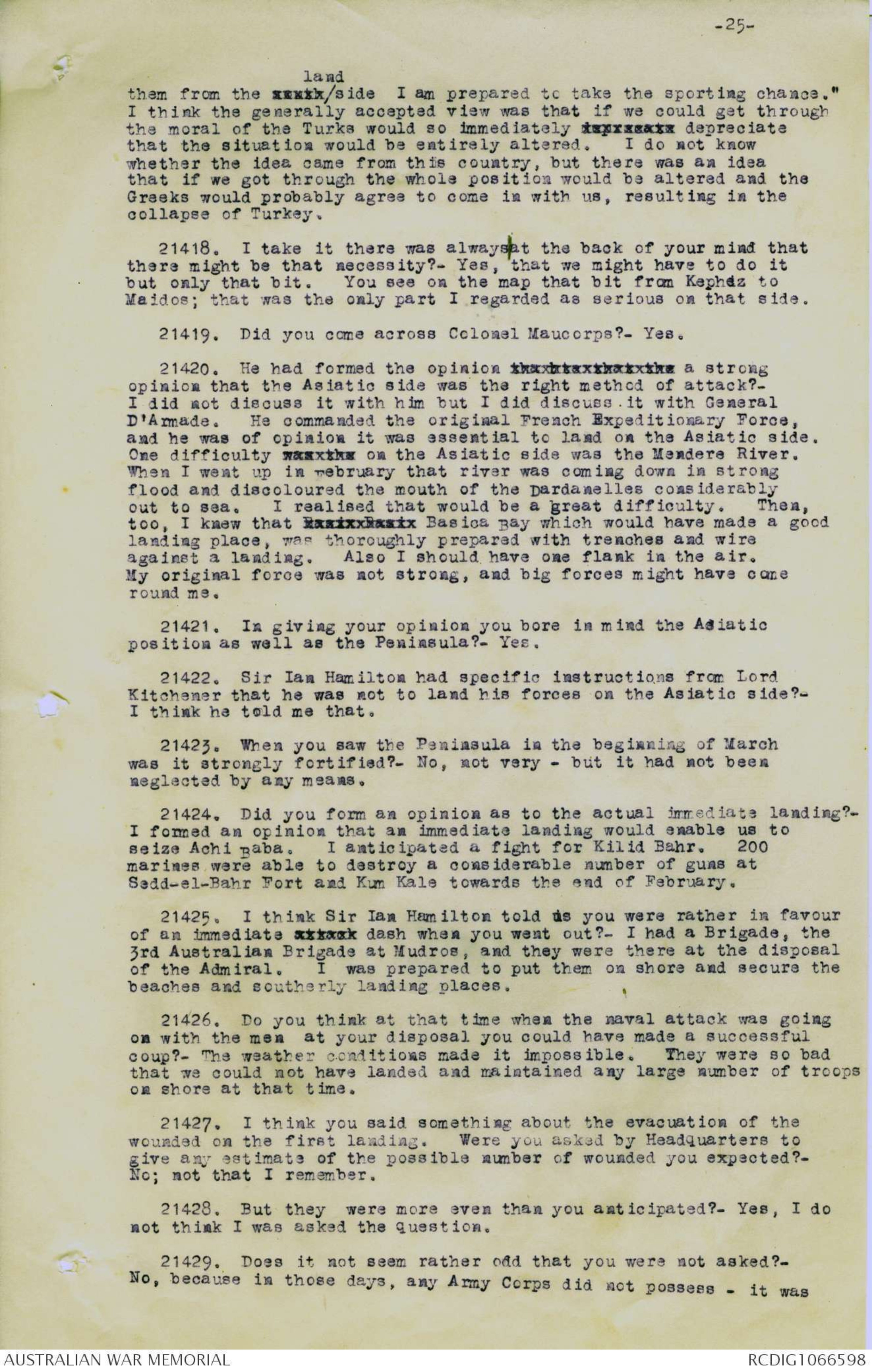
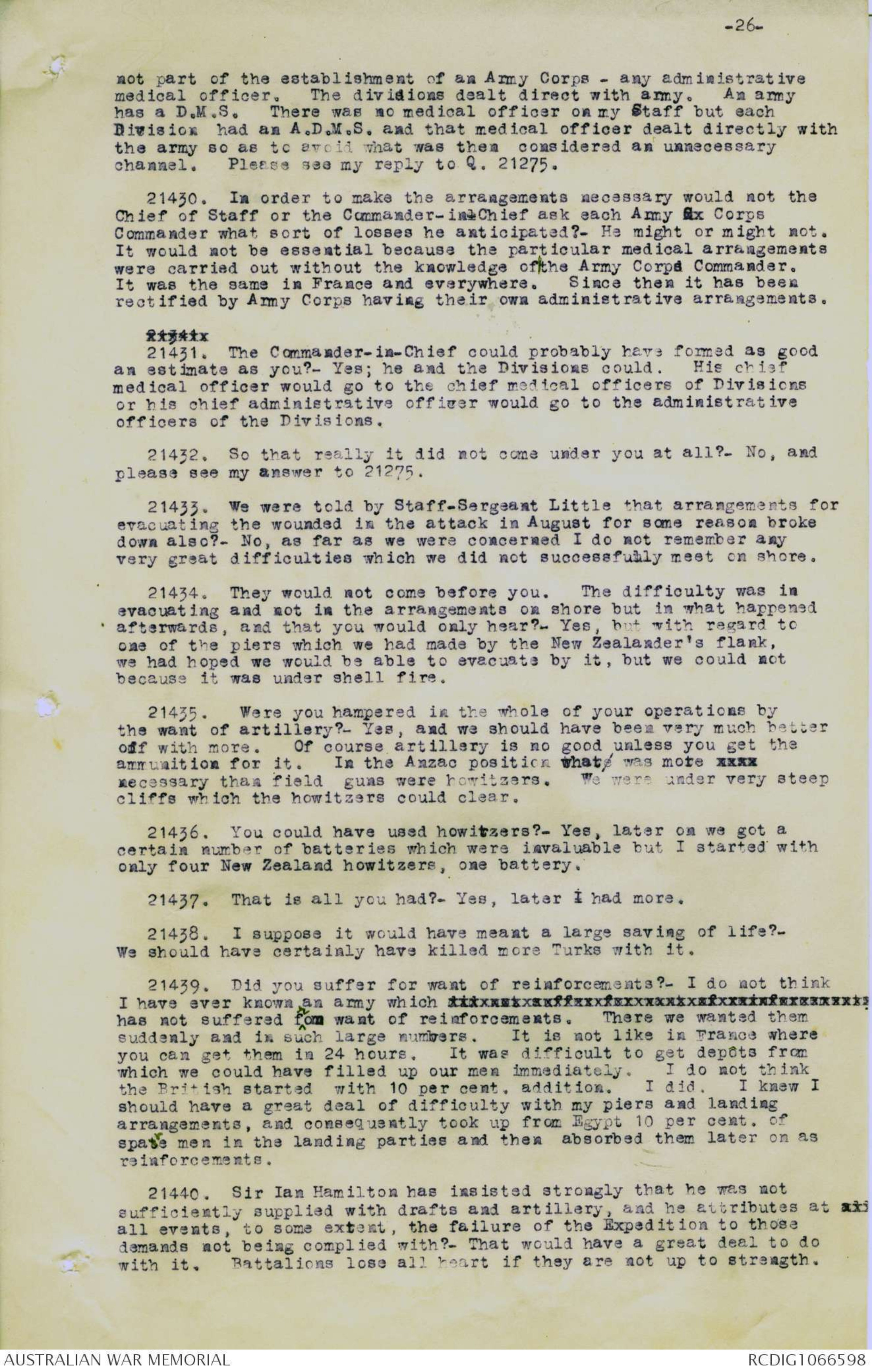
-17-
21347. Sir Thomas Mackenzie. But higher distinctions than that
had been given in connection with the Gallipoli Peninsula operations?-
Yes, perhaps so.
21348. It seems extraordinary that an achievement of that sort
was passed in that manner. Were you offered the command from Sir
Charles Monro, and did you actually take it over?- I had much hoped this
point would not have come up. I suppose I did take it ever. What
happened was that Lord Kitchener, after receiving Sir Charles Monro's
report, recommending the evacuation and return of the troops to Egypt,
telegraphed to say that Sir Charles Monro was being transferred to
Salonika, and that I was appointed to command the Mediterranean
Expeditionary Force at the Dardanelles. I knew Lord Kitchener very
well indeed, and was entirely devoted to him, as I always shall be to
his memory as the greatest of Englishmen and as the best friend I ever had
or can have. I was nine years on his Staff, and I thought that I could
see his reasons for carrying that out. He began the telegram by saying
he had just seen Commodore Keyes. Keyes, I know well, and I have the
greatest admiration for him. He was an absolute enthusiast on the
subject of getting the Navy thr-ough the Straits. He still felt it
was possible to do so; in fact, I think he had gone heme with the
Admiral's knowledge, to put those views before the Admiralty.
Lord Kitchener began his telegram like that, and as a matter af fact,
it contained proposals for further operations which I did not think
feasable, and which I immediately strongly advised against. I felt
instinctivelt that Lord Kitchener had been much influenced by Commodore
Keyes' enthusiasm. I thought that Lord Kitchener had acted possibly
rather hastily in transferring Sir Charles Monro. I felt that if that
was so, it was nota not a thing that would create confidence throughout
the Army. I felt Sir Charles Monro had been sent out to give his opinion
- that he had honestly done so, and that it was not right that inxxxxxxxxxxxx he should in consequence be immediately relieved of his
command. I wired to Lord Kitchener, having been nine years on his
personal Staff, asking xx him to reconsider it. I said, though Sir
Charles had recommended evacuation, I felt convinced that he was a man
who could be thoroughly relied upon to carry out any orders given by the
Government, better than I should do, even if it should not mean evacuation
and that he had already established confidence in these who had seen him
and I hoped Lord Kitchener would leave him where he was. Lord Kitchenerxx did not reply to that specifically, but he sent another wire to say
he feared evacuation might become necessary. I again wired, and said
if that were the case, all the more I hoped Sir Charles Monro might be
left in command, if only for the sake that I had landed the same day
with my troops, and I meant to leave the same day with them.
Lord Kitchener decided that he would do nothing until he came out there.
I then represented my views fully to him, when he said he agreed with
them, and practically decided in favour of a compromise, in that he left
me to command what the became the Dardanelles Army, under Sir Charles
Monro, who was appointed to the command of the troops generally in
the Eastern Mediterranean, which covered the command of the troops in the
Dardanelles and Salonika, with his Headquarters at Mudros. At the end
of December, General Monro had to proceed to Egypt to hand over the commandof the to Sir Archibald Murray, who took over the Eastern Meditarranean
Command with headquarters in Egypt, where I also proceeded after carrying
out the evacuation. of the troops at Cape Helles in January.
21349. You describe the commanding position that the capture of
Sari Bahr would have given our forces. De you think if we had established
ourselves at that point and had had reasonable reinforcements and proper
guns and ammunition, we could have forced the Dardanelles and finally
succeeded in our objective?- If the Suvla Bay landing had also been
successful and we had held up to Ejelmer Bay.
21350. It must have been a great disappointment to you, the failure
at Suvla Bay?- Yes, very great and bitter. I think it was as long age
as June that Sir Ian asked me for an appreciation and I then
recommended this movement to cut off the Turks.
-18-
21351. I suppose you wore at a loss to understand why the Suvla men
did not come on?- Yes, I was. A few days before they landed Sir lan hadxxxx sent General Stepford to see me and asked me to shew him what I
could of the country. I took him and his Chief Staff Officer, Reed
up to Russell's Top, which overlooked the whole of the Suvla Bay country.
After looking at it Stepford said to me : "I rather like the look of
this country more than I thought I should." I said : "I do not think
you will meet with very much opposition. As far as I know there are not
more than 2000 Turks over the whole of the country. I think you will
find a few at Cape Suvla and a few at Nibrunisi. Also I think you
will find a few entrenched in the middle of Suvla Bay, and if I had to do
it I would go in for the same tactics as I did when I landed, that is to x
land on as broad a front as you can and go straight through, you will
get it. You will find a certain number of trenches held, but once
you get round them you will are through. I think he was rather
impressed with the idea that it was necessary to have an artillery
bombardment. I said it was anticipated at my landing that I should
land after a bombardment by the Navy, but I said that was the last
thing that I wanted; I did not want my arrival advertised. It was
very scrubby country and I would far rather land and shove through with
a surprise than rely upon the result of a bombardment. I dare say you
see on that map about the letter "K" in Kislar Dagh I had once or twice
landed parties there. There was a fine young New Zealand officer,
Captain Blackett, I had landed him and one or two men on the coast
by a destroyer and set them to lie up during the day and observe the
country and bring me back a report the next night. We were being
bothered by artillery from the Chocolate Hills. These guns were
entrenched against attack from the south. I had all my preparations
made to land half a battalion about the "K" in Kizlair Dagh to take
these guns and re-embark before morning at Suvla Bay. I only refrained
because I did not wish to draw attention to my left flank. I explained
that to General Stepford, and suggested if he shoved on one battalion
at Chocolate Hill he would get there. I still think if they had known
where they were going the moment they set foot on shore they could
have done it.
21352. You think if you had had your Anzac men at Suvla Bay you
could have secured it?- I have no doubt about it.
21353. It was nearly a success?- Very nearly.
21354. And upon that you think largely would hinge the possibility
of getting through?- On cutting off the Straits.
21355. I mean finally getting up the Straits?- We should have
got over a great difficulty. We should have commanded the Narrows.
21356. And the Narrows were a great difficulty?- Yes, the greatest.
21357. Do you know any of the circumstances of Colonel Malone's
death?- No, I regret it most deeply because I looked upon him as a most
excellent, earnest officer, in whom I had the greatest confidence and
respect. We had a great deal of trouble with Quinn's Post which was
never put into a good state till Malone went there. He was killed
towards the top of Rhododendron Spur.
21358. You do not know whether he was endeavouring to rally some
of the troops at the time?- Nxx No, I never heard.
21359. Lord Nicholson. Do you know the scheme that Sir lan
Hamilton had in his mind when he landed the troops at Helles and Anzac
what he was going to do when he first landed?- No, I do not think I
knew anything more than the orders which were received. I understood
he was going to try to work from the toe upwards and the Anzac force
was a menace to cut across to Kilia Bay.
21360. We have had placed before us by Sir Ian Hamilton the
original conception of this plan drawn up by two junior officers, I
think Colonel Aspinall and it may have been Captain Dawney, but at any
rate Colonel Aspinall? - Colonel Aspinall was my chief staff officer
for the evacuation.
-19-
21361. In which the existence of Sari Bahr was absolutely ignored.
In this paper it is assumed that the force at Helles and the force
which was to be landed only a little bit north of Gaba Tepe, the one
was to seize Achi Baba and advance on Kilid Bahr and your force was to
go south and east in the direction of Kilid Bahr. The two forces were
then to assault Kilid Bahr and take it.?- That was the original
conception, but with regard to the your force the existence of Sari Bahr
and the difficult ground and the the fact that it dominated your
position entirely was ignored?. You never saw this paper?- I do
not think so.
21362. Nor did you ever have an appreciation of the situation
which led to the landing at these two points : you never had this place
before you?- I do not remember that because from the very first my
attention was fixed on Sari Bahr, and there was no reason why I should
see such an appreciation.
21363. In this paper which I have read carefully I find there is no
allusion to that except Sari Bahr is supposed to be rather an obstacle
to the landing at Suvla Bay?- I can only imagine that may have been an
appreciation written for Sir Ian's personal information and consideration-
as would be quite proper.
21364. It was the thing on which the order was based because these
comparatively junior officers chose these two places and the scheme of
landing was in the exact form of the conclusions arrived at in this
paper?- When this paper came to Sir Ian I am sure he at once saw the
necessity of our taking Sari Bahr.
21365. I do not think that he did at the time, because in his
first despatch he speaks of what a surprise it was when you landed
at Anzac to find such tangled and difficult ground in front of him?
I do not remember that because it was no surprise, though the country
proved mere difficult, rugged and broken than reconnaissance from the
sea - the only possible method - had led us to think. We had been up
the coast only a day or two before. We went up with Admiral Thursby.
I insisted on every military officer putting on a naval great coat on
these occasions so that the Turks should not suspect khaki spies coming
along. We realised the difficulties of the country, and it was
because of that I told Admiral Thursby I wished to land south of thexxx213 cove so as not to be landed in the great difficulties which
I knew existed.
21366. With regard to the Suvla force are you aware that General
Stepford in writing his operation orders for the Suvla landing, which
orders he submitted to General Headquarters for approval, specifically
said that his primary object would be to secure the Bay and the country
east of the Bay up to the ridge leading from Ejelmer Bay down to Biyuk
Anafarta?- Yes.
21367. Including Chocolate Hill and Ismail Oglu Tepe?- Yes.
21368. In stating this fact he also stated that there this might be so
formidable an attack that he might not be able to render you assistance.
Were you acquainted with the fact that this specific statement had
been made by Sir Frederiek Stepford and that the approval of General
Headquarters had been signified? - No, I never saw it.
21369. It makes a great deal of difference?- If he had been able
to carry out even the limited though very considerable part he thought
he could, it would have been of enormous assistance to us. That
would have included Hill 70. It would have prevented my being taken
in the rear by the enemy's guns on Hill 70, i.e., Ismail Oglu Tepe.
-20-
21370. Are you aware in Sir Ian Hamilton's despatch he states that
the cause of thefailure of Stepford's force was especially to be
ascribed to want of water and he makes almost a similar remark with
reference to your own xxxx?x force?- I read the despatch but I did not
realise that he saidx had said that the want of water was the cause of
failure.
21371. With regard to That was both with regard to Stepford's force
and the Anzac force, because he remarks about the Anzac force that all
your water arrangements went wrong at the critical moment?- No. I do
not think he attributed failure merely to want of water.
21372. He said that the people at Anzac were not the people to fold
their hands?- What he said that our pumping arrangements went wrong
probably meant was that our pumping arrangements went wrong. It was
a cranky old machine. It gave us constant anxiety and it did break
down just them. Though our anxieties about water were great I do not
think one could attribute the failure at of want of water. Both Anafarta
Sagar and Biyuk Anafarta were big villages for the maintenance of which
a certain amount of water was wanted. Had the troops at Suvla Bay
pushed on they would have found water. You will see the Susak well,
on the map there. That was a beautiful well, and there were wells all
up there, I think, if you looked for them. We found a good deal of
water at Aghil Dere. It wanted developing and it took time.
21373. I am not disputing the fact, I only asked if you are aware
of what he stated?- I read it, but I did not realise he attributed the
failure to want of water.
21374. He did do so in both cases, but more particularly so in the
Suvla Bay case?- At one time in our case on the Rhododendren Spur the
New Zealanders sent down to say "Unless you can give us water we cannot
guarantee the men holding out." Upon these rocky heights there was no
water.
21375. You are aware after this check or failure to get the
objective in that which was intended to be a combined operation Sir
Ian Hamilton being rather hard xxfor for troops stated to Lord
Kitchener he might have to abandon the Suvla Bay position?- Yes. Part
of it I believe.
21376. You are aware probably that on the 10th October Sir lan
Hamilton after the storm had taken place sent a telegram to the
Secretary of State for War to say that the original idea to land
at Suvla had been vindicated and at the same time the vital necessity
of maintaining himself in that locality was emphasised by a sudden
southerly gale on the night of the 8th and 9th October, both piers at
Anzac Cove having been washed away. He laid great stress on the
importance of Suvla with a short which a short time before he proposed
to evacuate?- I did not realise it said he actually proposed to evacuate
Suvla, but he might well have realised that he might be compelled to do
so.
21377. Yes it did; he said unless he could get reinforcements.
21378. Sir William Pickford. He said he thought he might have to?-
I remember Sir Ian asking me to come over to a conference at Suvla
and the question was put to us whether with our reduced forces and
casualties we could afford to give up Suvla, to which I was strongly
opposed. I said I had neglected my left all the time and the result
was the Turks had also. When once we had get troops there I at once
foresaw that if they were withdrawn the Turks would worry me most
infernally.
21379. Lord Nicholson. On the 16th October, Sir Ian Hamilton
was relieved of his command, and as a temporary measure handed ever the
command to you?- Yes.
21380. Immediately on your assuming command did you get a telegram
from Lord Kitchener for an appreciation of the situation?- Yes.
-21-
21381. On the 21st October, you telegraphed a long appreciation of
the situation?- Yes.
21382. You thought the Turks had about 125,000 men on the Peninsula,
and so many at call on the Asiatic coast, and so on. You say the best
result obtainable was by holding the Turks in the Gallipoli Peninsula in xx
large numbers, and to land a really good force on the Asiatic coast, and
make as rapid an advance as possible from Erenkeni Bay to Chanak?-
I wanted to land right away down south at Yukyeri Bay. It was on the
Asiatic shore. It is not on any of these maps.
21383. You wanted to have a force landed at Erenkeni Bay?- That was
to be in addition to the troops we had on the Peninsula.- a new
complete force such as the French had, I think, at one time contemplated
landing on the Asiatic shore, but for the fact of these troops being
sent to Salonika.
21384. General Monro arrived on the scene, and on the 31st October
he sent an appreciation of the situation in which he advised evacuation?.
Yes.
21385. I think Lord Kitchener at that time was on the point of
leaving England, but he telegraphed to say that General Monro must
consult his Corps Commanders?- Yes.
21386. He did so, and reported the result on the 2nd November.
You were opposed to evacuation. General Byng said he considered
evacuation advisable. General Davies said he agreed with General
Monro's views, and General Monro officially then says he adheres
to his previous opinion?- Yes.
21387. Although General Monro had taken the command, Lord Kitchener
telegraphed to you?- When General Monro came out from England to
take ever the command from Sir Ian he showed me his orders. These
contained a paragraph that, after seeing the situation on the Peninsula,
he was to proceed to Egypt, and, I think, Salonika, to guage the
general situation, and that during any such absence I was to take over
command at the Dardanelles. After making his report Sir Charles proceeded
to Egypt, leaving me in command as arranged, and naturally
must have informed the War Office of this. Lord Kitchener therefore
knew that I was commanding at the Dardanelles, and I presume wired to
me accordingly.
21388. This telegram was marked "Very Secret," and knowing you well,
he might have thought as you had been chief in command in chief
command, he might telegraph to you without impropriety. In this
telegram dated 3rd November, a very strong remark is made. Lord
Kitchener says : "I shall come out to you. I am leaving tomorrow
night. I have seen Commodore Keyes, and I believe the Admiralty
agree to make a naval attempt to force the passage of the Straits.
He then tells you you are to have the whole force in your command
in substitution for General Monro. He then asks you to work out
plans for the occupation of the Bulair Isthmus, and says :" We must
do it right this time. I absolutely refuse to sign orders for
evacuation, which I think would be a grievous disaster and would
condemn a large percentage of our men to death or imprisonment?-"
You received that?- Yes, that was the one I referred to just now.
21389. In reply, you deprecate this scheme of seizing the Bulair
Isthmus?- Yes.
21390. As regards the substitution of you in Chief Command for
General Monro, you state :" I sincerely trust that Monro will be
left in command here. He has already established confidence
in those who are under him, and his experience in France will be
invaluable"?- Yes.
21391. Before Lord Kitchener received this telegram, his being
dated the 3rd November, and yours the 4th, before you could have
on the 4th, before he could have received your telegram, he sends
you another order in which he says :” The more I look at the problem
-22-
the less I see my way through, so you had better very quietly and
secretly work out a scheme for getting the troops off the Peninsula" ?-
Yes.
21392. Thus, on the 3rd, having said he absolutely refused to sign
orders for evacuation, on the 4th he directs you to work out a scheme
for that object?- Yes. But he distinctly gives the reason for this
change of attitude in his second telegram, viz., that he fears the
Navy will not now risk to attempt to force the passage of the Straits,
which, of course, quite explains the change.
21393. On the same date, the War Office wired to you officially
to say that you had been appointed to command the Mediterranean Force,
and the command of the Salonika Force would be taken over as soon as
possible by General Monro?- Yes. I refrained from publishing this
in Orders,and kept it to myself - for reasons I have xxxxxx already
stated in Q. 21348.21349
21394. That was in spite of your very kind telegram, saying that you
would prefer that General Monro should continue to
hold the command?- Yes.
21395. You then were commanding the Mediterranean Force. On the
8th November, apparently, a question had been raised by the War Office
about the inadequacy of the water arrangements when the troops
were landed at Suvla Bay, and on the 8th November a most extraordinary
thing occurs. Instead of your telegraphing to the War Office, Colonel
Aspinall telegraphs to the War Office, and gives an account of the
arrangements for water that were made for the Suvla Bay landing,
and also for the arrangements for the Anzac at Anzac, about the time
when these arrangements in August were contemplated, and about the
vessel, called the "Prah", and all these things?- Is the telegram sent
in the name of Colonel Aspinall?
21396. Yes. It struck me as so peculiar. Why did you substitute
Colonel Aspinall for yourself in sending this?- I am afraid I have no
recollection of that.
21397. Will you look at it?- Yes.
21398. You were then in command?- Yes. All I can imagine is I
had a very small staff when I was in command. Originally, there
being only two staffs, the Army Staff and my own Corps Staff. Then
three Staffs had to be made; my original Anzac Staff remained with
the Corps, while General Monro naturally took over most of what had been
the General Headquarters Staff. I was left with Aspinall as
practically my sole General Staff Officer.
21399. But surely the General Staff would not send this telegram
about an administrative matter, namely water supply?- I can only
imagine that Aspinall knowing that it was not a question I had dealt
with before at all and thinking he knew about it answered it. He
may have asked me about it,but I have no recollection, or he may have
dealt with it himself. The probable explanation is that Colonel
Aspinall was about the sole survivor of Sir Ian's staff of August
who would know anything from first hand knowledge of the subject and
thought it best to answer it himself, though he may have spoken to
me about it. My senior Administrative Staff Officer had not been
on Sir Ian's staff.
21400. The telegram does not agree with the evidence which has
been placed before us, but that is perhaps a different matter, The
telegram presents a much more favourable view of what actually
occurred than what much of the evidence before us would lead us to
arrive at. But apart from that it is a very curious thing that
not only did your staff officer but a general staff officer send a
telegram when he could easily have put "From the Commander-in-Chief
of the Mediterranean Force” ?- Yes, I have no recollection of it.
-23-
21401. On the 22nd November Lord Kitchener being either at Gallipoli
or some place about there telegraphs to the Prime Minister a very
important telegram, No. 2927 A, speaking of the general situation, and
in this he remarks: "We might have taken steps effectively to prevent
their Eastern Campaign" - that is the eastern campaign of the enemy
the Germans, Austrians and Turks "by taking the offensive from our
position at Suvla Bay thus turning the Kilid Bahr position, thereby
enabling the Fleet to pass the Straits or by taking actionx the action
I suggested in the neighbourhood of Alexandretta." This is a very
surprising telegram because this is the very first time we have heard
of any large operation being based on Suvla. Do you know anything
about that?- That surely refers to the whole operations in Suvla in
August.
21402. Apparently he was much perturbed by the non-acceptance of
his proposal that we should take action at Alexandretta, and also laid
very great stress upon the difficulty of the defence of Egypt?- Yes
those are the results of meetings held on the "Lord Nelson" at which
Sir Henry MacMahon, Sir John Maxwell, Sir Charles Monro, Sir John
de Robeck, and myself were present. I think both Sir Henry MacMahon
and Sir John Maxwell were much more impressed than I was about
Mohammedan feeling. They had it very strongly indeed, and if I
remember aright, Maxwell thought a force of something like 300,000
men would be required for the defence of Egypt. Perhaps I impressed
Lord Kitchener to a certain extent with my hatred of the idea of
leaving the Peninsula to do nothing, and I said had I the ability to
see where I could strike the Turk really hard I should not mind so
much. Salonika at once jumped into my mind as a possible point
for launching a big attack, but more men were not wanted there.
It was then I think Sir Charles Monro recommended a landing at Ayas
Bay. From Alexandretta you do not absolutely cut the communications;
from Ayas Bay you do. He was recommending that, as a solution
of being able at once to cut the whole of the Turkish communications
to both Egypt on one side and Baghdad on the other, which a successful
landing there would have effected admirably. I am sure, though, the
naval difficulties were insuperable. You could not at that time
year have been able to make naval arrangements. There is no good base.
Farmagusta on Cyprus would have been the nearest, and it is bad.
21403. I laid some little stress on the mention of Suvla "by
taking the Peninsula from our position at Suvla." Suvla had always
been regarded as a secondary position next to Anzac and Helles, otherwise
Sir Ian surely would have occupied them in the first instance, but
however, some change of view obviously took place?- The situation had
been altered by the arrival of this very much larger force. I think Sir
lan looked at Suvla and Anzac combined as his main operations
having failed to take Achi Baba. The objective in August, i.e.
to cut the Turks off by land, could now be considered in conjunction
with the command of the Marmara by submarines - an item which was not
possible to take into consideration when the original landings were
planned.
21404. Will you ^kindly look at page 46. On the 2nd November ?December. another
important telegram is sent out by Lord Kitchener, in this case to [*Last*]
Lieut.-General Monro. It begins: "The Cabinet has been considering
the Gallipoli situation all day today." The important part of the
telegram is:"If the Salonika troops are placed at once at your
disposal up to four Divisions for an offensive operation to improve
the position at Suvla could such operations be carried out in time by
with the view of making Suvla retainable by obtaining higher positions
in greater depth. The Navy will also take the offensive in co-operation
Do you know that telegram?- Yes.
21405. It was referred to you for your opinion?- Yes.
21406. And General Monro replied on the next day that he was not
in favour of this proposal?- I do not know. I did not see his telegramxxx21427. 21407./ The day after that he replied giving a copy of your own
telegram?- Probably. I did not see it.
-24-
21408. He amplified his own reply by giving a copy. Your reply
was: "General Byng has always maintained, and I agree, that given more
troops and ample supply of howitzers and ammunition, he could push forward
forward and take the high ground in front of him," and so on." But
you thought the scheme impracticable and so did General Monro?-
In addition to that part of my reply which you have just quoted
I pointed out that it must be remembered that a large amount of
additional mule transport would be required to maintain troops in
forward positions, and large increases in hutting and roofing materials
for the new and exposed line - also a greatly increased reserve of
supplies would have to be landed. I quote the last sentence of my
telegram: "As to possibility of landing, provided troops could
land very early, it would apparently be as easy to land them as to
embark those already there, but lateness of season, and daily
increasing possibility of bad weather, makes question a complete
gamble. Relinquishment of xxxxxx Salonika could hardly be keptx secret, so chances of surprise would be small." The effects of
the blizzard had very much brought home to me the absolute necessity
of landing much engineer material.
21409. The result of that was that on the 7th December you
are aware of the telegram from Lord Kitchener to General Monro
saying the Cabinet had decided to evacuate?- That was sent to me as
well.
21410. But to retain Cape Helles for the present?- Yes.
21411. Mr. Roch. I think you made a reconnaissance of the
Peninsula as early as February?- Yes.
21412. And you sent a lot of telegrams home?- Perhaps half-a-dozen,
all through General Maxwell.
21413. I think you formed an opinion that the Navy had much
greater difficulties before them than were anticipated by the Naval
authorities?- Yes, I said I thought that I thought that the fact that xx
the Navy had been able to reduce the forts at the mouth of the Straits
was not a criterion of what they would be able to do when they got
further in. Please see my reply to Q. 21238.
21314. I think on the 4th March you sent home an ^the outline of a
possible plan of attack?- Yes.
21315. You the seemed to have formed an opinion that it would
have been necessary to transfer a force to the Asiatic side to deal
with the ground in the rear of Chanak?- Yes, I hearad it might be
necessary.
21316. Were you always of opinion that to make a success of
forcing the Straits, it would have been necessary to clear the Asiatic
side?- I was hoping it might not be, I said I was afraid I might be
forced to into it by but I hoped not because from a purely military
point of view it was so absolutely contrary to all the canons to
separate your force by a deep channel like the Straits. I wished by
all means to avoid doing it unless it was absolutely essential,
but I foresaw the possibility of having to do it.
21317. Even in the event of more or less successful operations
on the Peninsula itself did not you form any opinion as to whether
it might not be fruitless with such even with such success unless
the Asiatic side was also cleared?- I say I was doubtful in my
mind about it, but the general opinion certainly on the part of the
Navy was that provided we could clear Kilid Bahr we should be able to
get through. Admiral Thursby, with whom I was in entire
collaboration in talking to me said : "I am quite prepared to take a
fair sporting chance at anything, but I do not consider it to be a fair
sporting chance to try and force the Straits as they are. Mines we
are prepared to deal with; guns we are prepared to deal with; but
these hidden torpedo tubes under the point of Kilid Bahr I do not feel
give us a fair sporting chance. If you people can land and take
-25-
them from the xxxxx land/side I am prepared to take the sporting chance."
I think the generally accepted view was that if we could get through
the moral of the Turks would so immediately deprxcatex depreciate
that the situation would be entirely altered. I do not know
whether the idea came from this country, but there was an idea
that if we got through the whole position would be altered and the
Greeks would probably agree to come in with us, resulting in the
collapse of Turkey.
21418. I take it there was always at the back of your mind that
there might be that necessity?- Yes, that we might have to do it
but only that bit. You see on the map that bit from Kephez to
Maidos; that was the only part I regarded as serious on that side.
21419. Did you come across Colonel Maucorps?- Yes.
21420. He had formed the opinion thexxxxxthatxthe a strong
opinion that the Asiatic side was the right method of attack?-
I did not discuss it with him but I did discuss it with General
D'Armade. He commanded the original French Expeditionary Force
and he was of opinion it was essential to land on the Asiatic side.
One difficulty was the on the Asiatic side was the Mendere River.
When I went up in February that river was coming down in strong
flood and discoloured the mouth of the Dardanelles considerably
out to sea. I realised that would be a great difficulty. Then,
too, I knew that xxxxxxxxxxx Basica Bay which would have made a good
landing place, was thoroughly prepared with trenches and wire
against a landing. Also I should have one flank in the air.
My original force was not strong, and big forces might have come
round me.
21421. In giving your opinion you bore in mind the Asiatic
position as well as the Peninsula?- Yes.
21422. Sir Ian Hamilton had specific instructions from Lord
Kitchener that he was not to land his forces on the Asiatic side?-
I think he told me that.
21423. When you saw the Peninsula in the beginning of March
was it strongly fortified?- No, not very - but it had not been
neglected by any means.
21424. Did you form an opinion as to the actual immediate landing?
I formed an opinion that an immediate landing would enable us to
seize Achi Baba. I anticipated a fight for Kilid Bahr. 200
marines were able to destroy a considerable number of guns at
Sedd-el-Bahr Fort and Kun Kale towards the end of February.
21425. I think Sir Ian Hamilton told us you were rather in favour
of an immediate attack dash when you went out?- I had a Brigade, the
3rd Australian Brigade at Mudros, and they were there at the disposal
of the Admiral. I was prepared to put them on shore and secure the
beaches and southerly landing places.
21426. Do you think at that time when the naval attack was going
on with the men at your disposal you could have made a successful
coup?- The weather conditions made it impossible. They were so bad
that we could not have landed and maintained any large number of troops
on shore at that time.
21427. I think you said something about the evacuation of the
wounded on the first landing. Were you asked by Headquarters to
give any estimate of the possible number of wounded you expected?-
No; not that I remember.
21428. But they were more even than you anticipated?- Yes, I do
not think I was asked the question.
21429. Does it not seem rather odd that you were not asked?-
No, because in those days, any Army Corps did not possess - it was
-26-
not part of the establishment of an Army Corps - any administrative
medical officer. The divisions dealt direct with army. An army
has a D.M.S. There was no medical officer on my Staff but each
Division had an A.D.M.S. and that medical officer dealt directly with
the army so as to avoid what was then considered an unnecessary
channel. Please see my reply to Q. 21275.
21430. In order to make the arrangements necessary would not the
Chief of Staff or the Commander-in-Chief ask each Army Cx Corps
Commander what sort of losses he anticipated?- He might or might not.
It would not be essential because the particular medical arrangements
were carried out without the knowledge of the Army Corps Commander.
It was the same in France and everywhere. Since then it has been
rectified by Army Corps having their own administrative arrangements.21341x
21431. The Commander-in-Chief could probably have formed as good
an estimate as you?- Yes; he and the Divisions could. His chief
medical officer would go to the chief medical officers of Divisions
or his chief administrative officer would go to the administrative
officers of the Divisions.
21432. So that really it did not come under you at all?- No, and
please see my answer to 21275.
21433. We were told by Staff-Sergeant Little that arrangements for
evacuating the wounded in the attack in August for some reason broke
down also?- No, as far as we were concerned I do not remember any
very great difficulties which we did not successfully meet on shore.
21434. They would not come before you. The difficulty was in
evacuating and not in the arrangements on shore but in what happened
afterwards, and that you would only hear?- Yes, but with regard to
one of the piers which we had made by the New Zealander's flank,
we had hoped we would be able to evacuate by it, but we could not
because it was under shell fire.
21435. Were you hampered is the whole of your operations by
the want of artillery?- Yes, and we should have been very much better
off with more. Of course artillery is no good unless you get the
ammunition for it. In the Anzac position whats was more xxxx
necessary than field guns were howitzers. We were under very steep
cliffs which the howitzers could clear.
21436. You could have used howitzers?- Yes, later on we got a
certain number of batteries which were invaluable but I started with
only four New Zealand howitzers, one battery.
21437. That is all you had?- Yes, later I had more.
21438. I suppose it would have meant a large saving of life?-
We should have certainly have killed more Turks with it.
21439. Did you suffer for want of reinforcements?- I do not think
I have ever known an army which did not suffer for want of reinforcements
has not suffered f^rom want of reinforcements. There we wanted them
suddenly and in such large numbers. It is not like in France where
you can get them in 24 hours. It was difficult to get depôts from
which we could have filled up our men immediately. I do not think
the British started with 10 per cent. addition. I did. I knew I
should have a great deal of difficulty with my piers and landing
arrangements, and consequently took up from Egypt 10 per cent. of
spatre men in the landing parties and then absorbed them later on as
reinforcements.
21440. Sir Ian Hamilton has insisted strongly that he was not
sufficiently supplied with drafts and artillery, and he attributes at all
all events, to some extent, the failure of the Expedition to those
demands not being complied with?- That would have a great deal to do
with it. Battalions lose all heart if they are not up to strength.
 Deb Parkinson
Deb ParkinsonThis transcription item is now locked to you for editing. To release the lock either Save your changes or Cancel.
This lock will be automatically released after 60 minutes of inactivity.